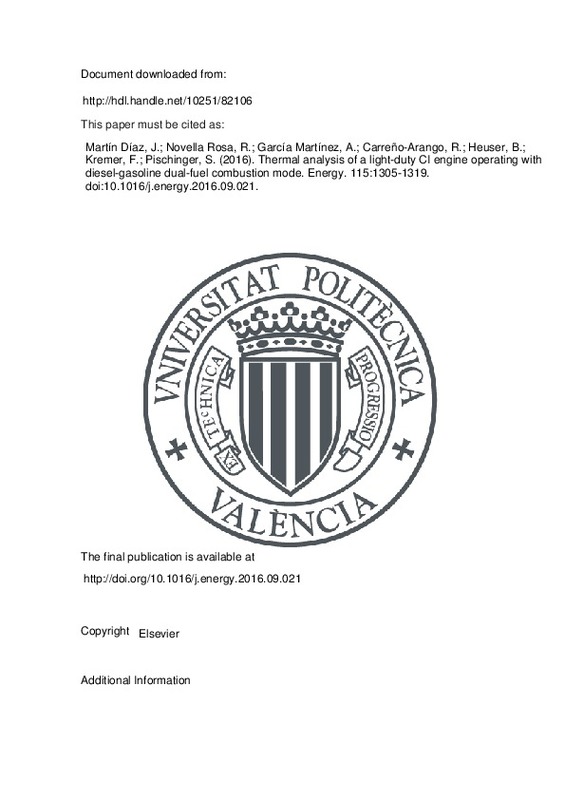JavaScript is disabled for your browser. Some features of this site may not work without it.
Buscar en RiuNet
Listar
Mi cuenta
Estadísticas
Ayuda RiuNet
Admin. UPV
Thermal analysis of a light-duty CI engine operating with diesel-gasoline dual-fuel combustion mode
Mostrar el registro sencillo del ítem
Ficheros en el ítem
| dc.contributor.author | Martín Díaz, Jaime
|
es_ES |
| dc.contributor.author | Novella Rosa, Ricardo
|
es_ES |
| dc.contributor.author | García Martínez, Antonio
|
es_ES |
| dc.contributor.author | Carreño-Arango, Ricardo
|
es_ES |
| dc.contributor.author | Heuser, Benedikt
|
es_ES |
| dc.contributor.author | Kremer, Florian
|
es_ES |
| dc.contributor.author | Pischinger, Stefan
|
es_ES |
| dc.date.accessioned | 2017-05-31T12:22:23Z | |
| dc.date.available | 2017-05-31T12:22:23Z | |
| dc.date.issued | 2016-11-15 | |
| dc.identifier.issn | 0360-5442 | |
| dc.identifier.uri | http://hdl.handle.net/10251/82106 | |
| dc.description.abstract | Reactivity Controlled Compression Ignition (RCCI) is one of the most promising premixed combustion modes, aimed at reducing simultaneously engine emissions and fuel consumption. In this work, the global energy balance (GEB) of a single-cylinder engine operating with dual-fuel and RCCI modes is analysed. The methodology used allows determining the energy degradation from the energy release during the combustion to the final work output, thus evaluating the performance of such combustion mode. The weight of each GEB term is analysed using two references: the injected and the burned fuel energies, thus decoupling the combustion and thermal processes. The analysis is performed by evaluating the effect of some key parameters: low/high reactivity fuel ratio, injection timing and EGR rate. The results show that increasing the low reactivity fuel leads to a better shape of the heat release rate, with a reduction of heat transfer and exhaust losses, thus improving the thermal efficiency about 1% with respect to a conventional Diesel combustion. Injection timing swept shows that a suitable optimization leads to further thermal efficiency increase up to 4%, while EGR has a limited effect. It is also concluded that there is still room for further improvement by reducing incomplete combustion losses. | es_ES |
| dc.description.sponsorship | The support of the Spanish Ministry of Economy and Competitiveness (TRA2013-41348-R) is greatly acknowledged. This work was performed in the frame of the Cluster of Excellence "Tailor-Made Fuels from Biomass", which is funded by the Excellence Initiative by the German federal and state governments. Thus, the authors would like to thank the Institute for Combustion Engines, RWTH Aachen University, for all the support to perform the research activities. | en_EN |
| dc.language | Inglés | es_ES |
| dc.publisher | Elsevier | es_ES |
| dc.relation.ispartof | Energy | es_ES |
| dc.rights | Reserva de todos los derechos | es_ES |
| dc.subject | Consumption reduction | es_ES |
| dc.subject | Dual-fuel | es_ES |
| dc.subject | Energy balance | es_ES |
| dc.subject | Heat transfer | es_ES |
| dc.subject | RCCI | es_ES |
| dc.subject.classification | MAQUINAS Y MOTORES TERMICOS | es_ES |
| dc.title | Thermal analysis of a light-duty CI engine operating with diesel-gasoline dual-fuel combustion mode | es_ES |
| dc.type | Artículo | es_ES |
| dc.identifier.doi | 10.1016/j.energy.2016.09.021 | |
| dc.relation.projectID | info:eu-repo/grantAgreement/MINECO//TRA2013-41348-R/ES/EVALUACION DEL EFECTO DE LA TRANSMISION DE CALOR EN LA CAMARA SOBRE LA EFICIENCIA DE MOTORES DIESEL DE PEQUEÑA CILINDRADA/ | es_ES |
| dc.rights.accessRights | Abierto | es_ES |
| dc.contributor.affiliation | Universitat Politècnica de València. Escuela Técnica Superior de Ingenieros Industriales - Escola Tècnica Superior d'Enginyers Industrials | es_ES |
| dc.contributor.affiliation | Universitat Politècnica de València. Departamento de Máquinas y Motores Térmicos - Departament de Màquines i Motors Tèrmics | es_ES |
| dc.contributor.affiliation | Universitat Politècnica de València. Escuela Técnica Superior de Ingeniería del Diseño - Escola Tècnica Superior d'Enginyeria del Disseny | es_ES |
| dc.contributor.affiliation | Universitat Politècnica de València. Instituto Universitario CMT-Motores Térmicos - Institut Universitari CMT-Motors Tèrmics | es_ES |
| dc.description.bibliographicCitation | Martín Díaz, J.; Novella Rosa, R.; García Martínez, A.; Carreño-Arango, R.; Heuser, B.; Kremer, F.; Pischinger, S. (2016). Thermal analysis of a light-duty CI engine operating with diesel-gasoline dual-fuel combustion mode. Energy. 115:1305-1319. https://doi.org/10.1016/j.energy.2016.09.021 | es_ES |
| dc.description.accrualMethod | S | es_ES |
| dc.relation.publisherversion | http://doi.org/10.1016/j.energy.2016.09.021 | es_ES |
| dc.description.upvformatpinicio | 1305 | es_ES |
| dc.description.upvformatpfin | 1319 | es_ES |
| dc.type.version | info:eu-repo/semantics/publishedVersion | es_ES |
| dc.description.volume | 115 | es_ES |
| dc.relation.senia | 323651 | es_ES |
| dc.identifier.eissn | 1873-6785 | |
| dc.contributor.funder | Ministerio de Economía y Competitividad | es_ES |
| dc.contributor.funder | RWTH Aachen University | es_ES |







![[Cerrado]](/themes/UPV/images/candado.png)

